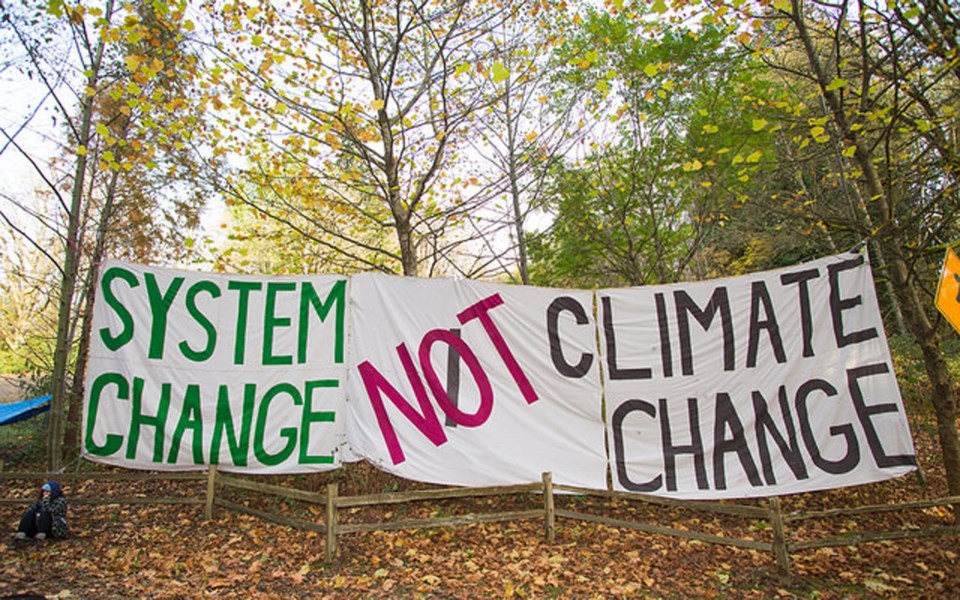Last week a poll by Forum Research showed more Canadians supported the Kinder Morgan Trans Mountain Extension Project (TMX) than opposed it. But this week a poll by the same company showed a slight majority opposed it—and the only thing that has changed is who owns the pipeline.
Most of us know that last week the federal Liberal government announced that it would buy Kinder Morgan's pipeline (now 60-plus years old) and its existing infrastructure for $4.5 billion, promising to continue with the pipeline-twinning project, estimated to cost another $7.4 billion over the next couple of years, to double the amount of bitumen brought to B.C.'s coast to ship to overseas markets.
(Don't forget that currently the TMX is the only pipeline on the books, so America has a stranglehold on the prices Canada can get for its oil products as it's the only market we have.)
And just to make sure Kinder Morgan didn't feel hard done by, the money paid by the feds will go in part to $1.5 million in bonuses for pipeline bosses—president Ian Anderson and David Safari, the vice-president overseeing the Trans Mountain pipeline expansion—to be paid in equal parts in July 2019 and July 2020. Standard operating procedure, apparently.
Kinder Morgan has had enough of dealing with Canada's deeply flawed regulatory process, which isn't protecting anyone—not Canadians, not industry and not Indigenous people.
And Canadians have had enough of a Liberal government that appears on the face of it to have lied about the processes around this pipeline extension. As an example, Prime Minister Justin Trudeau put a moratorium on oil tankers off B.C.'s north coast—clearly that is not going to happen if TMX goes ahead.
Did the Liberals have to step in and buy the pipeline to save Canada's reputation as a good place to do business? That's debatable.
Some would argue that by doing this the message to industry is that you can follow all the rules and invest billions and end up in a place where you have to be bailed out by the federal government. What industry would even consider investing where this is a possible outcome—not to mention that the government is facing opposition from its own citizens?
And what about the fact that Kinder Morgan wants out because the risk is too high. There are rising costs and long-term declining demand for fossil fuel after all.
"Not a single private investor wanted to buy the pipeline, which shows that this is a terrible investment," said tech company Wantoo CEO Michael Tippett in a press release supported by another 800 businesses. "Now as taxpayers we get to be on the hook for the environmental and economic cost of this boondoggle."
There is risk in the oil-sands industry. London-based HSBC, for example, announced on April 20 that it will no longer finance oil sand projects that involve building new facilities from the ground up, explaining that it is being driven by "the need to reduce emissions rapidly to achieve the target set in the 2015 Paris Agreement to limit global temperature rises to well below 2°C."
And how does supporting U.S.-based Kinder Morgan look to our Canadian pipeline proponents? Are the Liberals supporting Trans Mountain at the expense of its Canadian competitors, Enbridge and TransCanada?
There is perhaps another piece of this equation that hasn't got much publicity here. According to U.K. newspaper The Guardian, the Canadian government has an agreement with China going back to 2014 to build the pipeline—a FIPA, or Foreign Investment Promotion and Protection Agreement.
China is heavily invested in the oil sands. According to The Guardian, in 2009, "PetroChina bought a 60% interest in two undeveloped oil sands projects, containing an estimated 5bn barrels of oil. And in 2013, the Chinese state-owned CNOOC purchased the third-largest Canadian oil and gas company, Nexen, for $15.1bn. China needs the oil to help fuel its industrial growth."
What the FIPA allows China to do is sue Canada if provincial or federal policies are put in place that prevent it from making a profit from its energy projects.
So here we are this week witnessing protests across the country by citizens opposed to the purchase of the TMX, including one right here in Whistler last weekend as Canada's Minister of Finance Bill Morneau met with his G7 counterparts.
While the majority of people understand the importance of fossil fuels in our lives, and for our economic success, the environmental risk to B.C. and its coastline is just too high a price to pay.
With construction on the TMX pipeline to start this summer and a federal election not until October 2019, it's likely this story will see more protests and civil disobedience ... But let's be clear, no one is going to forget this move by Trudeau at the ballot box.




